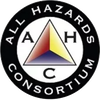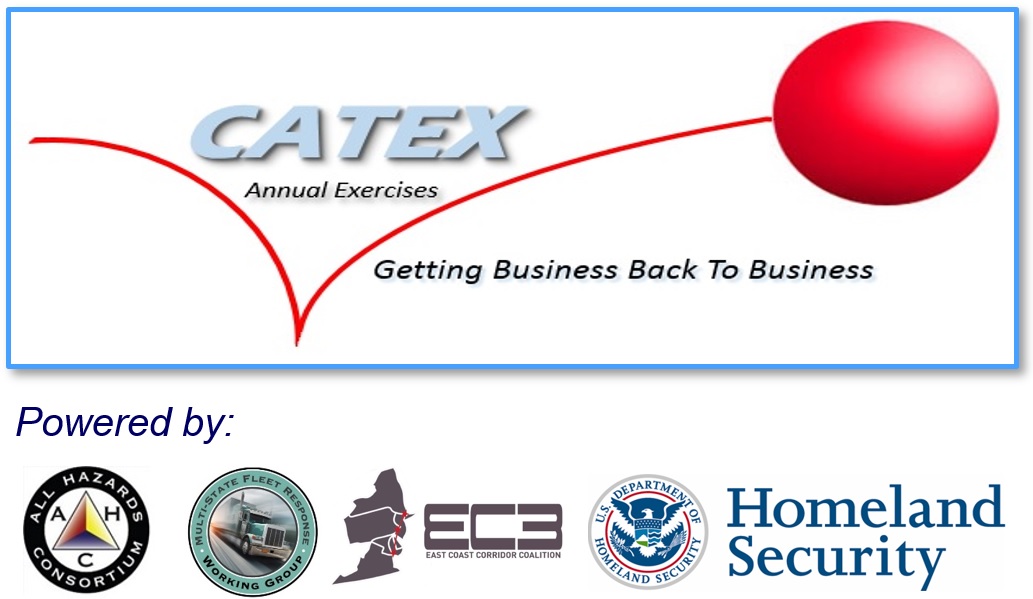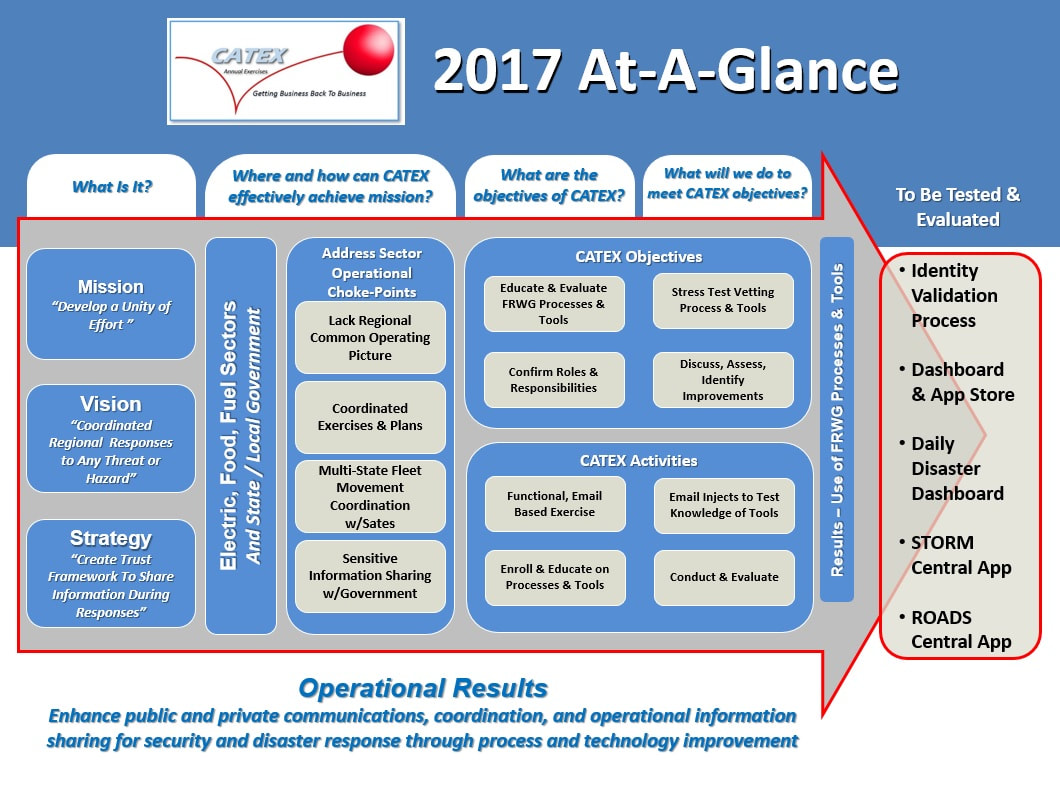CATEX 2017 Exercise Dates:
|
General Player/Participant Overview Webinar:
Date: Monday, June 12, 2017 Time: 1:00pm to 2:00 pm ET Location: Conference Call / Webinar Register to Attend: TBA |
CATEX Virtual Exercise:
Date: Tuesday, June 13, 2017 Time: 11:00am to 6:00 pm ET Location: Virtual, email based |
CATEX Problem Statement
During large, regional storms, disasters, or disruptions both industry and government operational decision makers need timely, “sometimes sensitive” information from reliable sources in order to make key operational decisions to effectively respond and recover quickly.
Lastly, exercising these processes and tools regularly determines how effective they become during disasters. The CATEX exercise series is designed bring industry and government together to periodically test sensitive operational information sharing procedures, processes, tools, roles and relationships to expose gaps and opportunities to improve information sharing across the enterprise of stakeholders.
During large, regional storms, disasters, or disruptions both industry and government operational decision makers need timely, “sometimes sensitive” information from reliable sources in order to make key operational decisions to effectively respond and recover quickly.
- Getting information from multiple states and sectors at the same time is very difficult during a regional incident. Decision makers need to see the big regional picture (e.g. reliable situational awareness to know “what is going on” and access to a “common operational picture” to know “who is doing what”).
- Government funded and operated information sharing systems are often not completely trusted, utilized or sustainable due to shifting government priorities, budget cuts, elections, and personnel turnover.
- Sharing information with government brings introduces potential risks to industry due to legal, regulatory, FOIA (Freedom of Information Act) requests, and competition.
- Industry requires control and more stringent legal, policy, process and technology protections in order to risk sharing “sensitive operational information” with government.
Lastly, exercising these processes and tools regularly determines how effective they become during disasters. The CATEX exercise series is designed bring industry and government together to periodically test sensitive operational information sharing procedures, processes, tools, roles and relationships to expose gaps and opportunities to improve information sharing across the enterprise of stakeholders.
CATEX Strategy
CATEX was formed out of FEMA’s Regional Catastrophic Planning Grant Program (RCPGP) in 2013 designed to promote regional planning and enhance public/private communication, coordination and information sharing for future large scale, multi-state disasters and/or security related incidents.
CATEX produces “information sharing” based products (processes, tools, policy, etc..) designed to expedite information flow between multiple states and the life-line sectors (e.g. power, food, fuel, transportation, telecommunications, medical, etc..) in order to help communities, governments and businesses get back to business faster following natural, man-made or accidental disasters.
CATEX focuses on producing information sharing based “exercise modules/drills”, designed by both public and private sector stakeholders that address their "sector specific operational choke points and issues" in their response efforts. These information sharing modules/drills, once tested, can then be integrated into future public and/or private sector exercises around the U.S.
CATEX was formed out of FEMA’s Regional Catastrophic Planning Grant Program (RCPGP) in 2013 designed to promote regional planning and enhance public/private communication, coordination and information sharing for future large scale, multi-state disasters and/or security related incidents.
CATEX produces “information sharing” based products (processes, tools, policy, etc..) designed to expedite information flow between multiple states and the life-line sectors (e.g. power, food, fuel, transportation, telecommunications, medical, etc..) in order to help communities, governments and businesses get back to business faster following natural, man-made or accidental disasters.
CATEX focuses on producing information sharing based “exercise modules/drills”, designed by both public and private sector stakeholders that address their "sector specific operational choke points and issues" in their response efforts. These information sharing modules/drills, once tested, can then be integrated into future public and/or private sector exercises around the U.S.
CATEX 2017 oVERVIEW
CATEX 2017 SCOPE
The All Hazards Consortium’s public and private sector working groups will conduct a virtual email based 1 day exercise that will focus on awareness and application of jointly developed information sharing based disaster response tools & processes in support of regional electric power restoration efforts across the Eastern United States and Canada.
This exercise will utilize a new innovative approach to virtual email based exercises and be the first of its kind in the United States. All participants will be players. No observers. No Evaluates. The process will simulate exactly how the AHC's government and indsutry participants respond to regional disasters today. Players will be sent emails, click links, watch short videos, test 3-4 web-based information sharing based tools/processes and provide feedback all in a virtual environment. This exercise will be operational, not discussion-based. Participants will attend the exercise virtually. Information sharing will be limited to email exchange and web-based collaboration tools. CATEX 2017 OBJECTIVES
CORE CAPABILITIES EXERCISED
Planning
Operational Coordination
Community Resilience
Risk And Disaster Resilience Assessment
Threats And Hazards Identification
|
THREAT OF HAZARD
Natural hazard, severe weather similar to a “Derecho” event
SCENARIO
Predicted but isolated severe weather in the mid-west turns into a regional, widespread severe storm with little to no advance notice. The storm is projected to pass over States in the Mid-Atlantic and Northeast regions during a period of excessive heat, high temperatures, and high electrical load periods.
SPONSORS
Critical Transportation
Logistics And Supply Chain Management
Operational Communications
|


